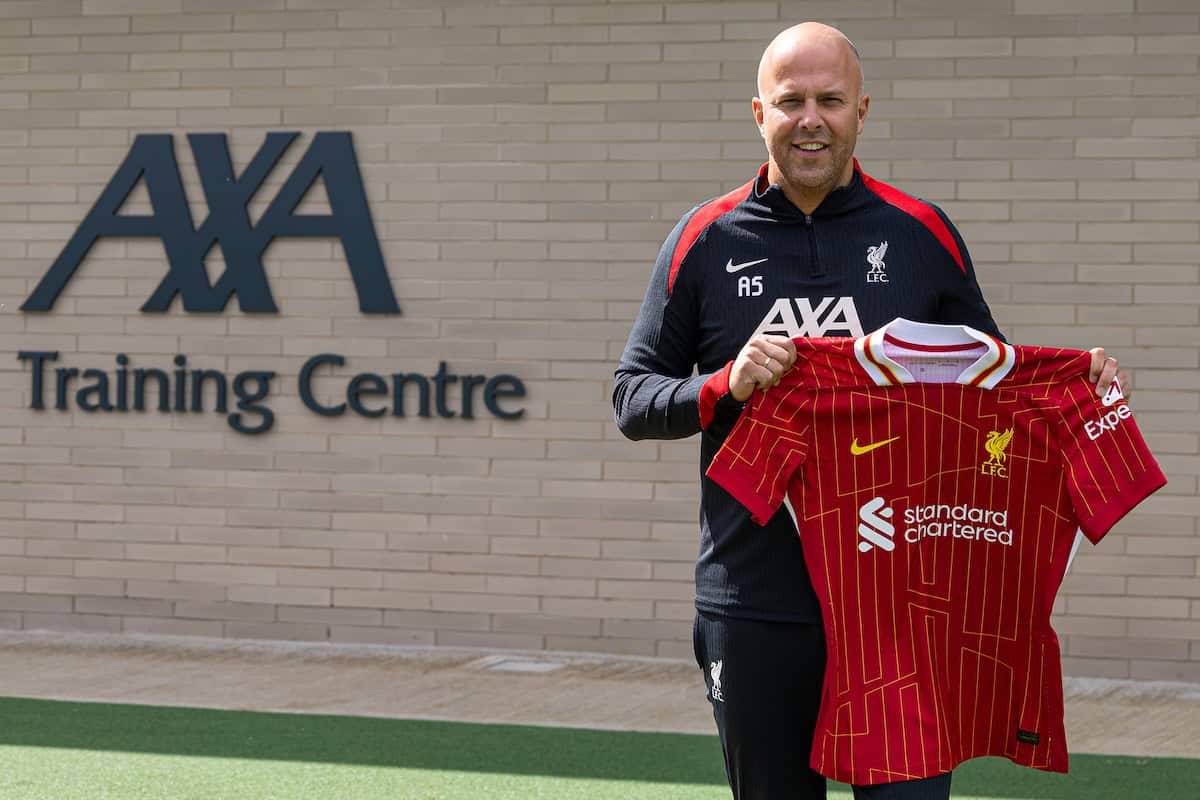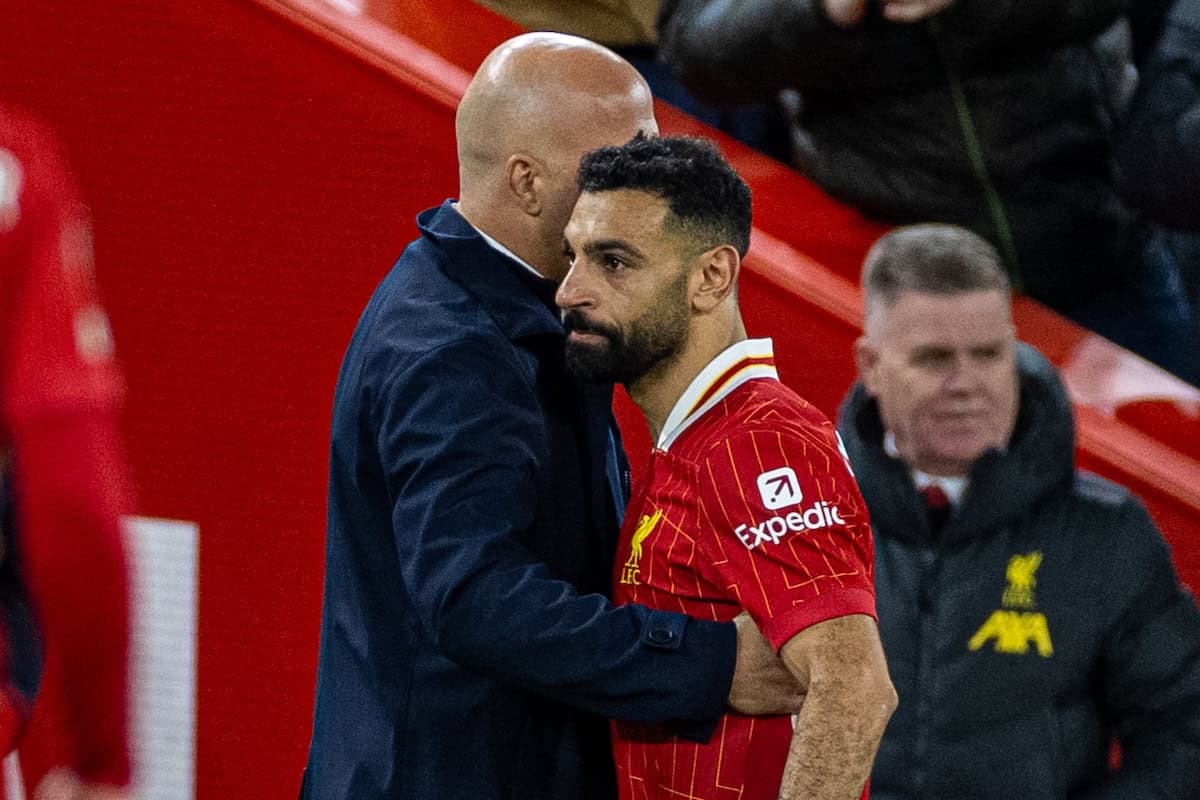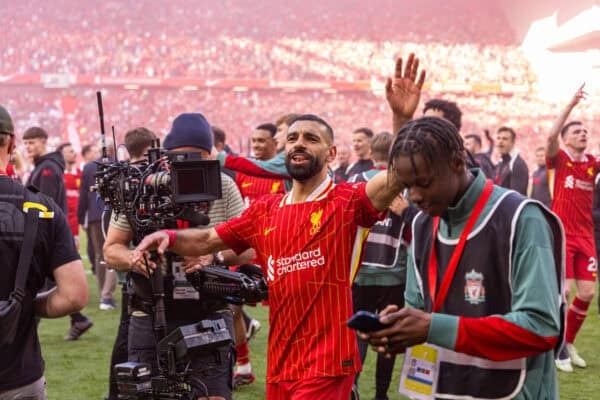The list of accusations and explanations used to first judge Arne Slot and try to undermine his success, since joining from Feyenoord last summer, has become increasingly desperate and amusing as the season has gone on.
‘A fraud who will be found out’‘A farmers league coach who won’t be able to cope with a proper league’‘He’s only done well because it’s Jurgen Klopp’s squad’‘It’s been a terrible Premier League anyway, see how he copes next year’‘Oh and did you know Bukayo Saka and Rodri got injured?’
Here’s another opinion that is grounded in a little more fact: Slot is one of only four managers since the formation of the Football League in 1888 to win the championship in his first season managing England’s top division.
Not even Pep Guardiola or Sir Alex Ferguson achieved that.

Of course, Slot has a long way to go before he can be considered in that stratosphere of coach. Yet, as someone who wrote last May that the club had made a fine decision hiring him, you can forgive a little smugness.
Not that Liverpool fans need convincing, the Dutchman having intelligently moulded and refined a group of players to lift only the club’s second league title in 35 years.
Nevertheless, there is one element of what Slot has managed to achieve that is still not getting the mainstream acknowledgement it deserves; namely, how he has been able to so effectively manage and motivate higher-profile players, often in very challenging circumstances.
The job at hand


It is worth laying out the context. Joining Liverpool was without doubt the biggest job of Slot’s career and his first outside his native Netherlands.
He had moved to probably the most scrutinised league in the world at one of its most scrutinised clubs. He was following in the footsteps of one of the club’s greatest-ever managers, to whom his new squad were extremely fond of.
And, not only was this squad of higher quality than he had ever previously worked with, but from the start he had to contend with the unwanted uncertainty about the futures of his three most important and influential players.
Expectations were not high and knives were already being sharpened from external sources.
To win the Premier League in your first season is one thing. To do so whilst circumnavigating such a level of potentially destabilising speculation about your three key players, who stand among the best in the world, takes the achievement to another level.
Managing the contract situaton


Not many coaches in world football would have been able to keep this side on the track toward success.
The fact the contract situations with Mo Salah, Trent Alexander-Arnold and Virgil van Dijk did not derail the title train is a testament not just to the focus of those players but the man management skills of Slot.
Despite a natural recent dip in Salah’s output, there was no real drop-off in the performances of any of this trio.
Throughout the season, journalists and opposing fans were salivating at the prospect of further rumoured disquiet coming from the players’ camps.
A sure sign that the screws were beginning to loosen and the wheels about to fall off on the Slot Machine. The ‘I told you so’ narrative was ready to be unleashed.
Yet apart from the odd comment from Van Dijk and Salah, there was no red meat for hacks to chomp into. There was no further controversy to spark drama and distract.
Questions to Slot were played with a straight bat, players’ focus was kept on the job at hand. The cheeky bid from Real Madrid in January for Alexander-Arnold could have threatened the tranquillity, as could the reports a few months later of a pre-contract agreement. They didn’t.
When there was a period in which Liverpool’s form across competitions stuttered, the diagnosis was tiredness rather than internal player issues.
It wasn’t until the final stretch of the season that the deals for Van Dijk and Salah were announced, by which point the record-equalling 20th league title had basically already been won.
Despite this backdrop over most of the season, Salah has produced more goals and assists than any other player in Europe’s top five leagues, Van Dijk has taken on even greater authority on and off the pitch and Alexander-Arnold was still able to perform and deliver big moments.
No egos here


In terms of the wider squad, players have been more than happy to be utilised in different positions, trusting in Slot’s judgement and believing in the wider cause.
Egos were left at the door to the AXA Training Centre and Anfield, following the example of Slot himself.
Look at how Ryan Gravenberch invested in being converted from a more attacking midfielder to a deep-lying defensive ball player, or Luiz Diaz switching at times from left-winger to centre-forward to enable Cody Gakpo to play in his best position.
There was an evident acceptance of the rotation in the full-back positions before injuries got involved and in the central attacking midfield role between Curtis Jones and Dominik Szoboszlai.
Meanwhile, those who haven’t had much game time, when it was sometimes merited, have never thrown the proverbial toys out of the pram. When called upon, the likes of Harvey Elliot, Wataro Endo and Federico Chiesa have been ready to step up and contribute.
The atmosphere of unity created by Slot and his coaches behind the scenes to enable this should not be underestimated.
Arne Slot’s man management skills


The Dutch are known for their stubborn streaks, but Slot’s ability to block out all the contract noise and find ways to get the best out of his big players has been admirable.
From the start, a great emphasis has been put on one-on-one player and full-squad meetings to analyse performances, assess training plans and honestly discuss areas for improvement, no matter the player’s status.
Clear communication has been the name of the game, fuelling togetherness with both collective and individual advancement.
This personal touch and skill for player engagement has helped Slot ingrain his tactical ideas and means that, when a change in tactics or selection has been needed during a game, the players have generally been able to respond.
It’s clear from Salah’s post-match comments following the title-clinching win that Slot listens to his players too.


“I told him as long as you rest me defensively, I will provide offensively,” revealed Salah.
“He’s the manager but he listens a lot, so I spoke to him and he bought the idea. You can see the numbers!”
The modern craze is for coaching zealots to arrive with clear playing identities that all players must succumb to, arguably sucking out the spontaneity and individual initiative that can create moments of brilliance.
The educationalist Slot has combined his concept of playing with subtle tweaks and flexibility to adapt to his players’ skills and preferences.
It is reported that he has rarely reacted badly during poor performances; his post-match calmness after a rare defeat mirrored in the changing room where the tactics board and level-headed honesty are his chosen weapons, rather than verbal bombshells.
He trusts in the work done on the training ground.
A strong group of leaders
This has created buy-in from a squad already blessed with leaders, mentality and talent. It perhaps explains why second-half improvements have been a feature of the league campaign, or how, despite not having much of a pre-season, Slot was able to win 11 of his first 12 matches, a record for a Liverpool manager.
There are challenges ahead for Slot. The squad rebuild is still needed and the intense spotlight on this will be turned up a notch despite the welcome agreements with Salah and Van Dijk.
Defending the league will be a huge accomplishment, with coaches more attuned to his tactics and improvements expected from rivals. Expectations will inevitably rise again.
Yet, by winning the Premier League title with four games to spare, Slot has done all he can do to reassure fans that he is the man for the job and the task of taking the squad to the next level.
When looking for Klopp’s successor, Slot apparently ticked almost every box when the Liverpool board were doing their highly proactive analysis.
However, it’s likely that ‘high-profile player management’ was one of the few boxes left unchecked. It’s time to get the pen out and correct that assessment.


















